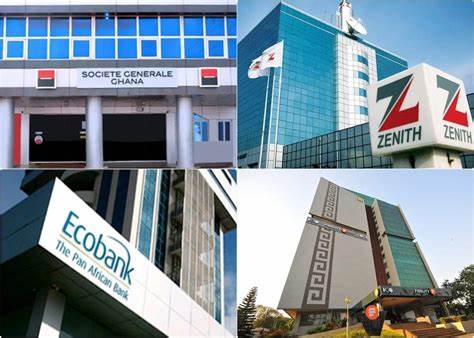Banks in the country registered ¢2.9 billion in the first four months of 2022, signaling a healthy industry, the Bank of Ghana has revealed.
This represented a 26.3 % growth, compared with 39.6% growth for the same period of last year.
The banks’ earnings were influenced by growth in net interest income and net fees and commissions. However, the growth margins went down, comparatively to last year.
Net interest income grew by 12.2% to ¢4.6 billion, compared to 18.4% growth a year ago. Net fees and commissions grew by 17.7% to ¢1.1 billion, compared with 26.5% growth last year, due to decline in trade finance-related activities in the economy.
Other income increased to ¢1.0 billion, representing 117.5% growth, relative to the contraction by 7.9% last year.
Banking sector assets remain strong
Also, developments in the banking sector also indicated strong performance, despite the reversal of the COVID-19 regulatory relief measures in March.
Total assets rose to ¢194.3 billion at the end of April 2022, about 24.8% annual growth, relative to 16.4% growth in the previous year.
The growth was underscored by increased deposits and borrowings.
Total deposits grew by 21.3% to ¢127.2 billion, while borrowings recorded a strong growth of 66.2% to ¢25.9 billion at the end of April 2022.
Financial Soundness Indicators robust
According to the Bank of Ghana, the key Financial Soundness Indicators also remained strong, with the Capital Adequacy Ratio at 21.3%, well above the regulatory minimum of 13.0%.
Importantly, Non-Performing Loan ratio eased to 14.3%, compared with 15.5% the previous year.
These developments resulted in a 22.1% jump in operating income to ¢6.7 billion, compared with 16.8% growth in the corresponding period of 2021.
Operating expenses recorded 23.0% growth compared to 1.7 % growth in the previous year.
Credit to private sector shows considerable improvement
The Bank of Ghana said credit to the private sector showed considerable improvement, almost back to pre-pandemic levels and broadly in line with the uptrend in economic activities.
In nominal terms, private sector credit recorded a significant annual growth of 26.5% in April 2022, compared with 6.9% in April 2021.
In real terms, however, private sector credit grew by 2.3%, due to sustained price pressures, relative to a contraction of 1.5% recorded for the same comparative period.
In terms of new advances, the data shows that credit growth continued to improve, reaching ¢16.4 billion, representing a 56.5 percent year-on-year growth.
Meanwhile, the latest credit conditions survey revealed that banks are however beginning to tighten credit stance on loans to enterprises and households. Despite the tightening of credit conditions, demand for credit by households and firms continue to remain strong.
Latest Stories
-
2024/25 GPL: Accra Lions on the cusp of relegation after 3-1 loss to Hearts
3 minutes -
GETFund warns public against fraudulent scholarship scams
18 minutes -
Ivan Bruce-Cudjoe launches bid for GBA presidency, promises to reset Ghanaian boxing
19 minutes -
If NPP doubts security services, they should go to court – Deputy Interior Minister
23 minutes -
Chaos spreads as desperate Gazans wait for food to arrive
25 minutes -
US Army and Ghana Armed Forces collaborate on medical preparedness
27 minutes -
Teenage mother names four men for paternity test as first accused is cleared
44 minutes -
Effective leadership behind Cedi’s gain – Mahama reponds to Bawumia
55 minutes -
You don’t own our democracy – Ahiagbah slams Mahama over arrests of NPP members
55 minutes -
National Security raid was to plant cocaine, weed, or gold in my home – Wontumi alleges
1 hour -
Licensed Gold Buyers charged to harness extended license transition deadline
1 hour -
AngloGold Ashanti commissions GH₵1.8m soap factory in Obuasi
2 hours -
GPL 2024/25: Nations FC host Samartex with league title insight
2 hours -
Monetary Policy Committee of BoG maintains policy rate at 28%
2 hours -
We’ll advise ourselves if gov’t continues to intimidate our members with security operatives – Nhyiaeso MP
2 hours

